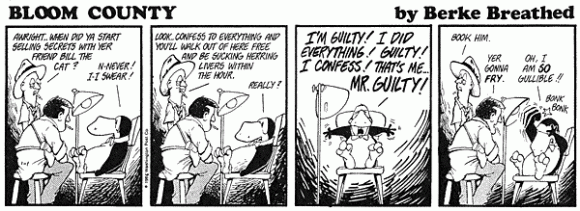One of the problems that we see all the time in the practice of criminal law is that people who are innocent are offered plea agreements that they feel that they can’t turn down. And then, when they have had a chance to sit in jail for a while, they call me (or some other lawyer) and say, “I’m here in jail, but I didn’t do it. Get me out of here.” And I have to say, “Sorry, I can’t.” In the U.S., we value finality in criminal judgments over accuracy. It is extremely difficult — virtually impossible, in Virginia — to get a case overturned on the ground that you are actually innocent. Back in the 1980’s, the U.S. Supreme Court held that it does not violate the Cruel and Unusual Punishment Clause of the Eighth Amendment to the U.S. Constitution to imprison someone who is actually innocent. The law is that you are guaranteed a fair trial, not a perfect trial, and if following all of the procedures that we have set up results in an innocent person being convicted, that’s just the breaks. Sorry about that. Have a nice life in prison.
But surely, you are thinking, if the person actually pled guilty, they must have done it! I read an interesting draft law review article today on the question of why innocent people plead guilty to things that they didn’t do. (The terms of my reading the draft article are that it is not for distribution to others, or I would share it with you.) The article talked about various studies and psych experiments, comparing a woman who pled guilty to murder that DNA evidence later showed she did not commit with a psych experiment where subjects would agree that they had done something wrong when they hadn’t. In both cases, the “plea” of guilty was based on perceived benefit. In the case of the criminal defendant Ada JoAnn Taylor, who served 19 years before she was released when the DNA evidence came to light, she pled guilty because she was persuaded that if she went to trial, she would face a much longer sentence.
But surely, you are thinking, this doesn’t happen very often. Well, the draft article cites research that makes an interesting point. Police elicit confessions from suspects that they have decided are probably guilty (that’s why they get arrested). In one study, once DNA evidence is taken from the presumably guilty person, in roughly 25% of the cases, the DNA obtained either as the last step before arrest or after arrest shows the person to be not guilty. In other words, in about 25% of the cases, the police have identified the wrong person. The universe of cases where a false guilty plea are likely is fairly similar to the universe of cases where the wrong person is arrested. In fact, it would be reasonable to assume that the people who plead guilty when they are innocent is virtually entirely included in the universe of people who are wrongly arrested or almost arrested. [Disclaimer on the statistics — DNA evidence is mainly important in murder and sexual assault cases; it is rarely important in property crime cases. So do not take this as meaning that in 25% of all of the cases, the police are focusing on the wrong person. Rapes and murders account for a small percentage of the total number of cases prosecuted. The problem is that we have no objective way of knowing who might be guilty of, say, a breaking and entering case; unless the person cut himself when he went in the window, there is rarely any way of knowing definitively who the perp is. So we can’t know how reliable the police work is in those cases. We also don’t have any scientifically valid way of discussing the quality of the evidence. But is it more likely that the police detectives work up a breaking and entering case more thoroughly than they do a murder case? But I digress.]
So how do we reduce the likelihood of false guilty pleas? One important way is to stop using mandatory minimums and threats of long sentences. In most parts of the world, American, and particularly Virginian, sentences seem barbarically long. In one recent case, I had a client who I am absolutely confident was innocent of the sex crime with which he was charged. The prosecution was based on the testimony of someone who would have been subject to extensive impeachment, and her testimony would probably not have been believed. Had we gone to trial, and had the jury believed her, he would have faced a minimum sentence from a jury of 5 years, maximum of life. Instead, he was offered a chance to plead guilty to a misdemeanor and receive an entirely suspended sentence. He chose to plead guilty to something that he did not do, because the disparity between the possible consequences of a conviction were so horrible. If the consequences of a guilty finding had not been so horrible to him, it might have made sense for him to go to trial and give the criminal justice system a chance to get things right.
I hope that the legislature and the prosecutors will address this problem, but I doubt that they will. All of the political pressure is to lock up more people, not fewer. The rise of finality as a virtue superior to getting it right was a major effort by Justice (later Chief Justice Rehnquist) going back to the 1970’s. In the 1990’s, finality was virtually enshrined by Congress. In Virginia, finality has long been more important than getting it right. I’m not holding my breath for it to change.


